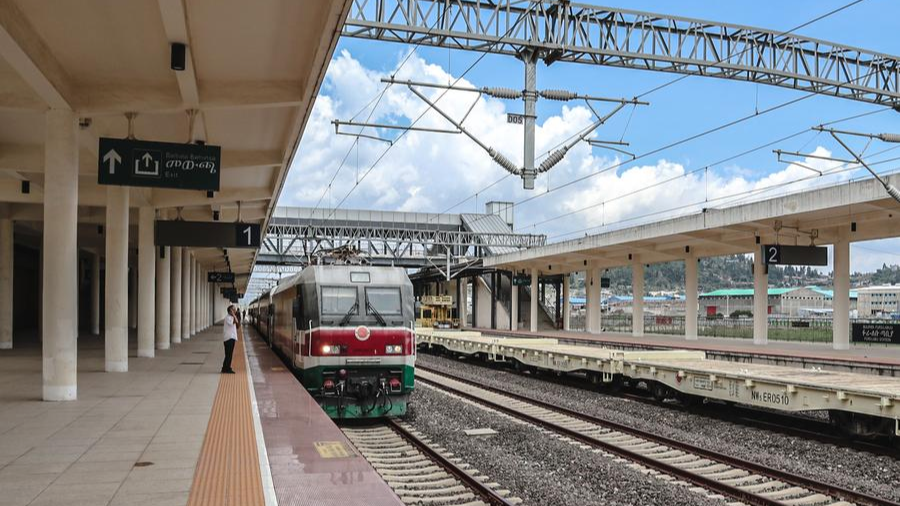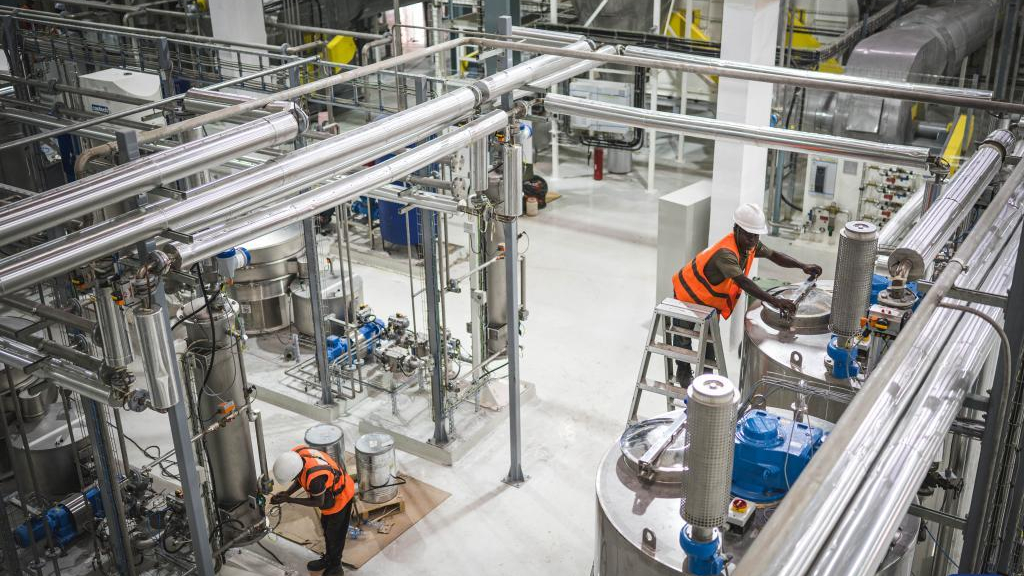
A train at the Lebu Railway Station in Addis Ababa, Ethiopia, May 10, 2024. /Xinhua
Editor's note: The fourth plenary session of the 20th Communist Party of China (CPC) Central Committee is to be held in Beijing this October, a decision made at a CPC Central Committee Political Bureau meeting on July 30, 2025. CGTN launches the "China's economy: A new chapter unfolds" series. The second article focuses on how China's trade with African countries brings multilateral benefits. Djoomart Otorbaev, a special commentator on current affairs for CGTN, is a former prime minister of Kyrgyzstan, a professor of the Belt and Road School of Beijing Normal University, a member of Nizami Ganjavi International Center, and the author of "Central Asia's Economic Rebirth in the Shadow of the New Great Game." The article reflects the author's views and not necessarily those of CGTN.
The Political Bureau of the Communist Party of China (CPC) Central Committee held a meeting on July 30, 2025. The meeting emphasized the need to expand high-level opening up and stabilize the fundamentals of foreign trade and foreign investment. It also emphasized optimizing export tax rebate policies and developing high-quality open platforms such as free trade pilot zones.
China's trade with developing countries has been playing an essential role in local economic and social development. A key factor in the sharp decline of global extreme poverty is the growing involvement of developing countries in international trade. These countries comprise 48 percent of global trade, compared to just 33 percent in 2000. Meanwhile, the population living in extreme poverty has been reduced by half since 1990, falling to just under one billion. Trade has enhanced the quantity and quality of jobs in developing nations, stimulated economic growth and boosted productivity.
To sustain this positive trend, leading nations should continue encouraging international trade growth with developing countries by cutting trade barriers, offering financial and technical support and enhancing infrastructure. Critically, this must not involve creating new obstacles to mutually beneficial trade.
This year has seen significant changes in international trade, with China and the U.S., the two largest economies, adopting contrasting trade policies. One is liberalising trade and cutting barriers, while the other imposes strict trade restrictions even on the poorest nations. An example of this is the differing trade approaches of Beijing and Washington towards African countries.
Since 2008, China has been Africa's largest trading partner. In 2024, trade volumes reached $295.56 billion, with imports from Africa increasing by 6.9 percent year-on-year to $116.79 billion.
During a June China-Africa cooperation meeting, Beijing announced that it lifted tariffs on all imports from 53 countries with diplomatic ties, significantly simplifying African goods' access to the Chinese market. Most African exports to China are commodities like oil, minerals and metals, with Angola, the Democratic Republic of the Congo (DRC), and South Africa being the leading partners.
China aims to boost African exports of industrial and agricultural products, though these still represent a small portion of total imports. It invests heavily in Africa's services, infrastructure and construction sectors. China continues to attract investment in Africa, especially in infrastructure projects such as railways and roads.

Workers check the equipment at a cocoa processing complex in the PK24 Industrial Park on the northwestern outskirts of Abidjan, Cote d'Ivoire, May 27, 2025. /Xinhua
This move sharply contrasts with Western powers' protectionist policies, reinforcing China's reputation as a dependable and equal partner for Global South nations. Africa's other major trading partners do not offer the same market access.
For instance, the European Union offers similar duty-free and quota-free benefits through its Everything But Arms program, but only for Least Developed Countries (LDCs). Non-LDC African nations typically depend on Economic Partnership Agreements (EPAs), often bilateral or regional, involving complex negotiations and mutual commitments. The controversy surrounding EPAs is significant. For example, Nigeria has chosen not to sign it.
Likewise, the U.S. grants duty-free access for certain goods via its African Growth and Opportunity Act (AGOA). While many African countries use AGOA, the agreement remains uncertain and can be revoked at any time.
On April 2, 2025, U.S. President Donald Trump issued an Executive Order enacting broad tariffs on imports into the U.S. from 190 countries and territories. The Trump administration introduced these tariffs in two stages. First, starting April 5, 2025, a uniform 10 percent tariff would be imposed on imports from all those countries.
Then, beginning April 9, 2025, the American administration announced that 57 nations would be subject to higher country-specific tariffs, ranging from 11 to 50 percent. Out of 57 countries experiencing tariff hikes, 20 are in Africa. The tariffs on African exports will increase from as low as 11 percent for Cameroon and the DRC to as high as 50 percent for Lesotho.
Besides Lesotho, the African nations with the highest additional tariffs are Madagascar (47 percent), Mauritius (40 percent), Botswana (37 percent), Angola (32 percent), Libya (31 percent) and Algeria and South Africa (both 30 percent). Twenty-nine African countries, including Egypt, Ethiopia and Kenya, face a 10 percent baseline tariff increase. Only Burkina Faso, the Seychelles, and Somalia are exempt from these increases, likely because they each have a trade deficit with the U.S.
The announcement of the tariffs coincides with the continued growth of U.S. trade with Africa. According to the U.S. Trade Representative, U.S.-Africa trade reached roughly $71.6 billion in 2024. U.S. exports to Africa totalled $32.1 billion, marking an 11.9 percent rise from 2023, while imports from Africa were $39.5 billion, a 1.9 percent increase. Thus, the U.S. trade deficit with Africa last year was $7.4 billion. Notably, although the growing trade deficit was the reason for the president's recent order, the deficit with Africa has decreased by 26.4 percent compared to 2023.
Immediately following the announcement of tariffs, countries worldwide, including those in Africa, sought to initiate negotiations with the Trump administration regarding new tariffs. The White House reported that over 75 nations had entered talks within less than a week of the April 2 announcement.
African nations responded differently: Some, like Zimbabwe, suggested unilaterally removing tariffs on U.S. imports, while others, like Uganda, focused on developing more resilient and self-sufficient domestic economies. Meanwhile, countries like Lesotho, Madagascar and South Africa announced they were forming delegations in hopes of negotiating bilateral agreements with the U.S.
On April 10, 2025, African WTO members – Cape Verde, Cameroon, Gambia, Liberia, Nigeria and Sierra Leone – joined a group of 39 "Friends of the System" and signed a communique. They pledged to collaborate closely to shape the future of the global trading system, committing to making results-driven decisions and taking bold collective actions that adapt to the evolving international economic landscape and address upcoming challenges.
How can Africa shield itself from discriminatory tariffs? One approach is to boost intra-African trade through initiatives like the African Continental Free Trade Area (AfCFTA). Alternatively, Africa might diversify its trading and political partnerships to lessen reliance on the U.S., for instance, by engaging with emerging economies such as the BRICS group, which includes South Africa, Egypt, and Ethiopia on the continent. However, it may be necessary to create alternative trading options. The American administration's discriminatory policy is expected to impact mutual trade negatively.
(If you want to contribute and have specific expertise, please contact us at opinions@cgtn.com. Follow @thouse_opinions?on Twitter to discover the latest commentaries in the CGTN Opinion Section.)
阅读原文:https://news.cgtn.com/news/2025-07-30/Two-contrasting-trade-policies-are-being-implemented-worldwide-1FqWiN4I67S/p.html